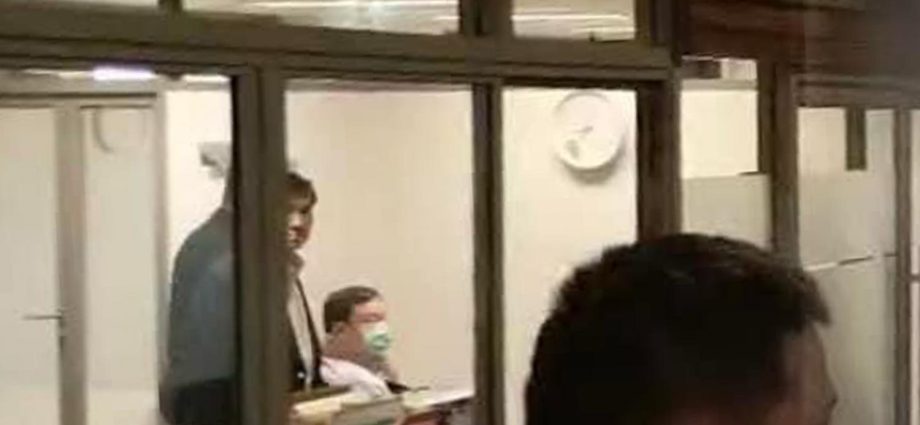Faces S112 case as Srettha feels the heat

Convicted former prime minister Thaksin Shinawatra looked seriously ill when he reported to the Office of the Attorney-General (OAG) over a lese majeste charge on Monday, according to a senior prosecutor.
Preecha Sudsa-nguan, director-general of the OAG’s office of criminal cases, said Thaksin was sitting in a wheelchair because he was too weak to walk. Furthermore, Thaksin had lost his voice and wore a neck brace throughout their meeting, Mr Preecha added.
Thaksin is accused of defaming the monarchy in comments made while on a trip to Seoul, South Korea, on May 21, 2015.
Mr Preecha said Thaksin was released on bail of 500,000 baht on Monday and ordered to return to the OAG on April 10 to hear the decision of the attorney-general in the case.
OAG spokesman Prayut Phetcha-rakhun said that after Thaksin was paroled on Sunday, police from the Technology Crime Suppression Division took him into custody over the latest court action against him.
Police on Monday escorted Thaksin to the OAG where Attorney-General Amnat Chetcharoenrak considered Thaksin’s recent petition for fair treatment in the case.
Mr Amnat decided there should be an additional investigation as Thaksin requested, Mr Prayut said.
On Sept 19, 2016, then Attorney-General Pongniwat Yuthapanboripan decided to indict Thaksin. At the time, Thaksin was a fugitive, and the former attorney-general told police to seek an arrest warrant from the Criminal Court. The court issued the warrant.
On Jan 17 this year, public prosecutors and police informed Thaksin of the charge and a related computer crime charge. Thaksin denied the charges and filed a written petition for fair treatment.
On May 21, 2015, Thaksin gave an interview with the Chosun Ilbo daily in Seoul and claimed privy councillors supported the May 22, 2014, coup that ousted the government of his younger sister, Yingluck Shinawatra.
A video clip of the interview was viewed widely on Thai social media.
Police believe comments made during the interview could have violated both the computer crime law and Section 112 of the Criminal Code, known as the lese majeste law, which provides for a punishment of 3-15 years in prison for each offence.
Meanwhile, the political temperature in Thailand is expected to increase, according to political observers.
Many have suggested the release of the former prime minister poses a challenge to the incumbent Srettha Thavisin, who must now demonstrate his independence.
Thaksin has long been seen as the de facto leader of the ruling Pheu Thai Party, now led by his youngest daughter, Paetongtarn Shinawatra.
Political observers believe Thaksin will continue to exert influence and anticipate a potential shift in power from Mr Srettha to Thaksin, resulting in a so-called double prime minister phenomenon.
Responding to criticism from Senator Kittisak Rattanavaraha that Mr Srettha would become a star without a light after Thaksin’s release on parole, Mr Srettha said: “They can say whatever they like. But I will wake up at seven tomorrow and go to work and attend a cabinet meeting.
“Next week, I will go on an inspection trip to the South, and the following week, I will go abroad for talks on free trade agreements and look for new foreign investors. Whatever they say will not discourage me. I will carry on with my work for the country’s benefit.”
He also dismissed speculation that a cabinet reshuffle may be on the cards and said his relationships with coalition ministers remain healthy.
Upon his return from 15 years of self-imposed exile, the Supreme Court jailed Thaksin for eight years in three cases of abuse of authority and conflicts of interest, but the sentence was subsequently commuted to just one year by royal pardon.
Thaksin was seen leaving the Police General Hospital in a van together with his two daughters at 6.10am on Sunday, the first day of his parole.
Later, at about 6.30am, Ms Paetongtarn posted on Instagram that they were home at their Ban Chan Song La residence in Bang Phlat district.

